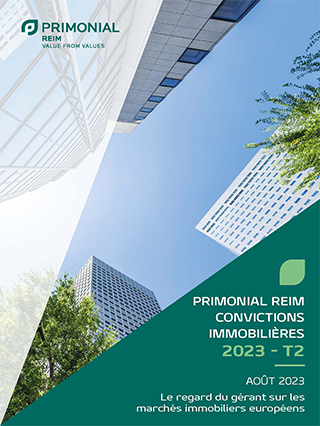- Home
- Studies and research
- Real estate convictions Europe: 2nd quarter 2023
Real Estate Convictions Europe : 2nd quarter 2023
Although some economies contracted towards the middle of the year, global growth could prove more resilient than predicted over 2023 as a whole.
Despite continued high levels of uncertainty, several positive factors for the economy have emerged: energy prices are more moderate, demand seems better distributed and supply-chains are being rebuilt with fewer disruptions. As a result, predictions of global growth have improved on previous forecasts and now stand at 3.0% for both 2023 and 2024.
Whilst euro zone economic activity has so far withstood the significant supply shocks, the threat of contraction remains (geopolitical tensions, high inflation, effects of higher interest rates). Euro zone GDP growth is expected to be positive in 2023 (+0.6%) and 2024 (+1.2%). However, some indicators show that the trend remains fragile. Meanwhile, significant divergence occurred over the first half of 2023, with a group of countries outperforming the European average, while others, such as Germany and Austria, saw at least one quarter of economic contraction. Looking at the main economies individually, GDP growth in Spain is expected to be +2.2% in 2023 and then +1.3% in 2024, followed by Belgium (+1.3% then +1.0%), the Netherlands (+0.7% and +1.4%), Italy (+1.2% and +0.9%), France (+0.6% and +0.8%), and Germany (-0.5% and +0.9%).
A rate hike beyond July “would at most be a possibility, but by no means a certainty”, according to one of the members of the ECB’s Governing Council. Euro zone interest rates are therefore approaching their upper level. Indeed the ECB has indicated that it no longer wants to make automatic rate hikes at its forthcoming meetings. The institution wants to ensure that rates are sufficiently restrictive, for as long as necessary, to produce as quickly as possible the return of inflation at its 2% medium-term target. Revised economic forecasts and the trend in inflation, particularly core inflation (excluding energy and raw materials), will therefore be key when it comes to the ECB’s monetary choices over the next few months.
The ECB’s decisions have been successful, as the harmonised euro zone CPI (consumer price index) fell from 8.6% in January to 6.9% in March and then 5.5% by the end of June 2023. However, by the end of the first half significant disparities between countries persisted. The Baltic states, Austria, Germany, Italy and the Netherlands were still experiencing inflation of over 6%. Countries around the average included France, Ireland and Portugal, where inflation was between 4% and 6%. Lastly, inflation was below 4% in Greece, Spain, Belgium and Luxembourg.
Investors’ wait-and-see approach caused a slowing in real estate activity, as a direct consequence of higher interest rates and the continuation of the ECB’s monetary tightening. After a lifeless first quarter, in the second quarter of 2023 the European market became stuck. However, it was investors’ selective approach which held the market back. Investment volumes were low, at slightly under €70 billion of commitments in the first six months of 2023, against €160 billion over the same period in 2022. It is interesting to notice that allocation changed, towards greater diversification within real estate envelopes, to the detriment of offices in particular.
Looking at the major countries, investment volumes were over €18 billion in the UK (down 58% over the year), €14 billion in France (-28%), €11 billion in Germany (-53%), just under €5 billion in Spain (-43%), €3 billion in the Netherlands (-63%) and less than €2 billion in Italy (-74%).
Offices remained the largest asset class, with nearly €20 billion, or 30% of the market, followed by retail (€14 billion) and residential (€13 billion) with 20% of the market each, logistics (€12 billion – 18% of the market), hotels (€6 billion, 8%) and healthcare (€3 billion, 4%).
Regarding capital flows, investors have favored their domestic market (58%), led by institutional investors (22%), private investors (22%), users (10%), and listed real estate companies (4%). International capital flows outside of Europe (23%) predominantly came from the United States (15%), Canada (3%), and Singapore (2%), while European cross-border capital flows mainly originated from France (5%), Germany (4%), and the United Kingdom (4%).
Income return is still driving real estate performance. After a period of correction, the duration of which will vary from one market to the other, asset values are likely to enter a period of stabilisation due to the increasingly modest nature of interventions from the ECB. Hotels, retail and healthcare offer the highest return in Europe. From mid-2022, the ECB adopted a drastic policy of increasing interest rates to bring down inflation. This policy resulted in a rebuilding of the risk premium on different asset classes. However, the trends vary between asset types and markets.
According to the latest total return data, consisting of rental income and capital growth, the hospitality, retail, and healthcare sectors have performed the best in the early months of 2023 in Europe.
The logistics sector decompressed the earliest (starting from the end of 2022) and most significantly. Consequently, it will provide an attractive entry point in terms of valuation, at least for modern assets adapted to the gradual automation of the industry.
The rapid rise in interest rates has resulted in an increase in the cost of debt. It is the ‘capital growth’ component that is affected by an increase in the cost of money. It is also this component that will allow investors to seize opportunities once the situation has stabilised. Pending this, it is income return that contributes positively to performance. Because income return is indexed in part or in whole on the European consumer price index, income performance remains on a good track.
Sources of data: Praemia REIM Research & Strategy, Immostat, CBRE, Savills, BNP PRE, JLL, Knight Frank, MSCI, Oxford Economics, Eurostat, OCDE, FMI, Stabel, NSI, CZSO, DST, Destatis, Stat, CSO, Statistics, INE, INSEE, DZS, ISTAT, CSB, Statistics Lithuania, Statec, KSH, CBS, Statistik Austria, Stat Poland, INE, INSSE, Statistics Finland, SCB, SSB, BFS, ONS, STR, Operators

The team

Henry-Aurélien Natter joined Praemia REIM as Research Manager in January 2018. He has the mission of developing the analyses of the Research & Strategy Department on the real estate markets, the economy and capital in France and in Europe.
Henry-Aurélien Natter began his career at Les Echos Etudes (formerly Eurostaf), then at C&W (formerly DTZ), and lastly at BNP PRE, where he acquired solid and varied experience in real estate research, strategy and finance. He is qualified with an AES degree in Business Management, a Masters Decree in management and SME management, and an International Master in commerce and marketing.
You may also like

- Market review
Real Estate Convictions : Q4 2024
The continued reduction in ECB interest rates, the level of savings amongst Europeans and the recovery of the real estate markets between 2022 and 2024 all point to the potential for improvement and a rebound in the sector.

- Market review
Real Estate Convictions : Q3 2024
In October 2024, the ECB announced its third consecutive rate cut to ease its restrictive monetary policy, and we believe that a new momentum has opened up for the European real estate market. Indeed, this quarter we have seen a thaw in certain real estate indicators.

- Market review
Real estate convictions : 1st quarter 2024
For now, European real estate professionals have been cautious and are watching for the tipping point that could occur with the announcement of the first change in direction by the ECB.


 et Firefox
et Firefox 